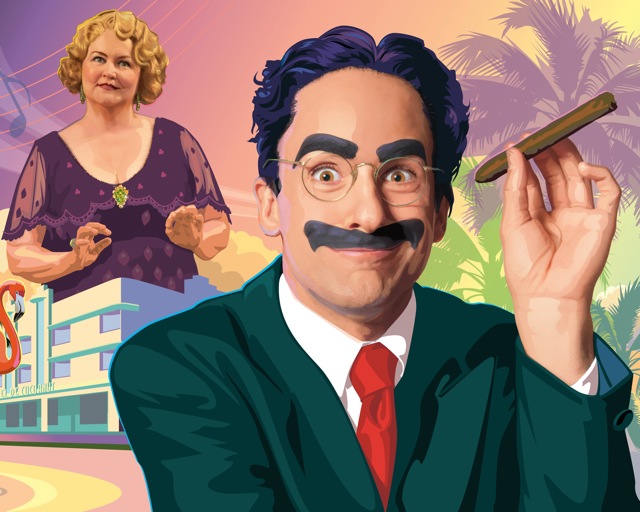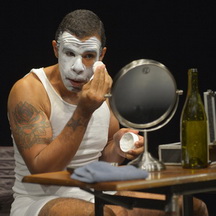 Groucho lives!
Groucho lives!
Oregon Shakespeare gets silly
I remember breaking up at the moment in A Night at the Opera, when Groucho tries to explain the sanity clause in a contract to Chico, and Chico just laughs: “You can’t fool me, there ain’t no Sanity Claus.” That brand of verbal nuttiness marked the best of the Marx Brothers – it set them apart – and, like an inmate escaped from a looney bin, it runs delightfully amok in Oregon Shakespeare Festival’s fast and funny production of The Cocoanuts.
At times you don’t know what hit you. You just know you’re laughing.
Like 1930‘s Animal Crackers, the 1929 movie of The Cocoanuts was based on a stage musical the Marx Brothers had starred in. Oregon Shakespeare had a hit in its adaptation of Animal Crackers a couple of years ago. Its current 2014 revisit to another early Marx Brothers success doesn’t attempt to be the movie of The Cocoanuts, and it can’t be the 1925 stage show, because (1) there were many versions of it, and (2) some of the material is hard to find or lost.
One thing that isn’t lost is a pair of other names associated with the original: playwright George S. Kaufman and Irving Berlin, who wrote the songs. Wow. Those two, plus the Marx Brothers, add up to a lot of talent, and Oregon Shakespeare has doubled down with talent of its own: adaptor Mark Bedard, who gave the OSF show a strong through-line, musical director, Gregg Coffin, who assiduously assembled the score from many sources, choreographer Jaclyn Miller, who provided many witty dances, and director David Ivers, who organized the Marxian mayhem into a well-oiled laugh machine.
I confess I wasn’t crazy about this Cocoanuts at first. It felt like (yawn) another jazz-age spoof, like The Boy Friend, but the minute Mark Bedard showed up as Groucho, the show took off and never came down. Bedard is a brilliant impersonator. With his slouching walk, his giddy insouciance and his waggling cigar, he’s Groucho personified. I forgot I wasn’t in the presence of the real guy, and Brent Hinkley’s Harpo and John Tufts’ Chico are very good, too. When the three of them get surreally going, you realize that making sense isn’t all it’s cracked up to be..
All this takes place in the precincts of a failing Florida beachfront hotel. There’s a love story between a couple of earnest kids who deserve each other but not the old folks who stand in their way. They’re not what matters, however. What counts are the goofy hijinks that go on around them – they’re what make The Cocoanuts one to see.
Shakespeare gets his due in Ashland, too. On the serious side OSF is mounting The Tempest and Richard III, and on the silly side Two Gentlemen of Verona and The Comedy of Errors. I also caught Comedy of Errors during my too-brief recent visit. Directed by Kent Gash, it has something in common with The Cocoanuts in that OSF sets it in the 1920s, but the locale is different, Harlem rather than Florida, and the production features a largely African American cast.
The result is energetic, strikingly costumed and pumped up with the beat of hi-de-ho music. The actors give it their all (maybe too much all), but though the packed audience with which I saw it laughed and awarded it generous applause, I was only intermittently entertained. The play is minor, with none of the complexity or grace of one of the Bard’s great comedies, like Twelfth Night. It’s a one-joke tale centered around mistaken identity, and though Shakespeare works the idea for all it’s worth, it’s still pretty thin, and OSF tries too hard to convince us what a good time we ought to be having.
Still, The Cocoanuts, which plays until November, should be enough to lure you to a season that includes Madeline L’Engle’s A Wrinkle in Time, Stephen Sondheim’s Into the Woods, Lorraine Hansberry’s The Sign in Sidney Brustein’s window, and The Great Society, Robert Schenkkan’s follow up to his Tony Award winning All the Way. For tickets/information call 541-482-4331 or visit www.osfashland.org. The Marx Brothers
– ROBERT HALL
